Hillary Clinton recently stirred controversy during her appearance on CNN, where she discussed the need for stringent regulations on social media platforms. Arguing that these platforms play a crucial role in shaping public discourse, she emphasized the necessity for them to censor certain content to maintain control over the information landscape. Clinton specifically criticized Section 230 of the Communications Decency Act, which previously granted immunity to online platforms for user-generated content, advocating for its repeal. She posited that the simplistic view of these platforms as mere pass-throughs is outdated, asserting that without active moderation, society risks losing control over the narratives that shape public opinion.
In her discussion on social media regulation, Clinton called for a more hands-on approach to content management, stating that platforms like Facebook, Twitter (now X), Instagram, and TikTok must take responsibility for the information circulating on their sites. She expressed concern that failure to monitor and moderate content could lead to a loss of societal control over critical issues. The implications of her statements suggest a significant shift towards increased censorship and regulation, igniting debates about the balance between free speech and the need to curb misinformation in an age dominated by digital communication.
In addition to her critiques of social media, Clinton also touched upon the issue of smartphones in educational settings, declaring that phones should be removed from schools. She cited ongoing experiments on the effects of technology, particularly on children, and asserted that there is now enough evidence to warrant such action. Clinton expressed her satisfaction with schools that have started implementing policies whereby students are required to surrender their phones upon entering the building. This stance highlights her concerns about the detrimental impact of mobile technology on children’s focus, learning, and overall mental health.
Clinton’s comments, however, did not stop at education and social media; she also invoked the idea of imposing legal repercussions for the dissemination of what she labels “misinformation.” In her remarks last month, she suggested that individuals in the U.S. who propagate false information could face civil or criminal charges. This proposal ignited significant backlash, raising questions about the implications for free speech and the potential for governmental overreach in policing public discourse. Clinton’s concerns, rooted in the context of alleged foreign interference in American elections, reflect a broader anxiety about the integrity of information and the influence of various actors on electoral and democratic processes.
Furthermore, Clinton’s suggestions have ignited debates around the interpretation of the First Amendment, as critics argue that her proposed solutions would infringe on fundamental rights. The proposal to jail individuals for misinformation raises ethical concerns about who defines misinformation and the potential chilling effects on political discourse. This has led many commentators to voice their apprehensions regarding the balance of power and the role of government in regulating speech in a democracy.
Ultimately, Clinton’s recent statements signal a call for a collective re-evaluation of how society interacts with technology and media. As she advocates for stricter controls on social media and the removal of phones from schools, the underlying concern appears to be about preserving societal order and truth in a world increasingly influenced by digital communication. However, the tension between regulation and freedom of expression remains a critical point of contention, suggesting that discussions around media influence, misinformation, and digital responsibility are far from over. The future of these conversations will likely shape the contours of public policy and democratic engagement in the digital age.

